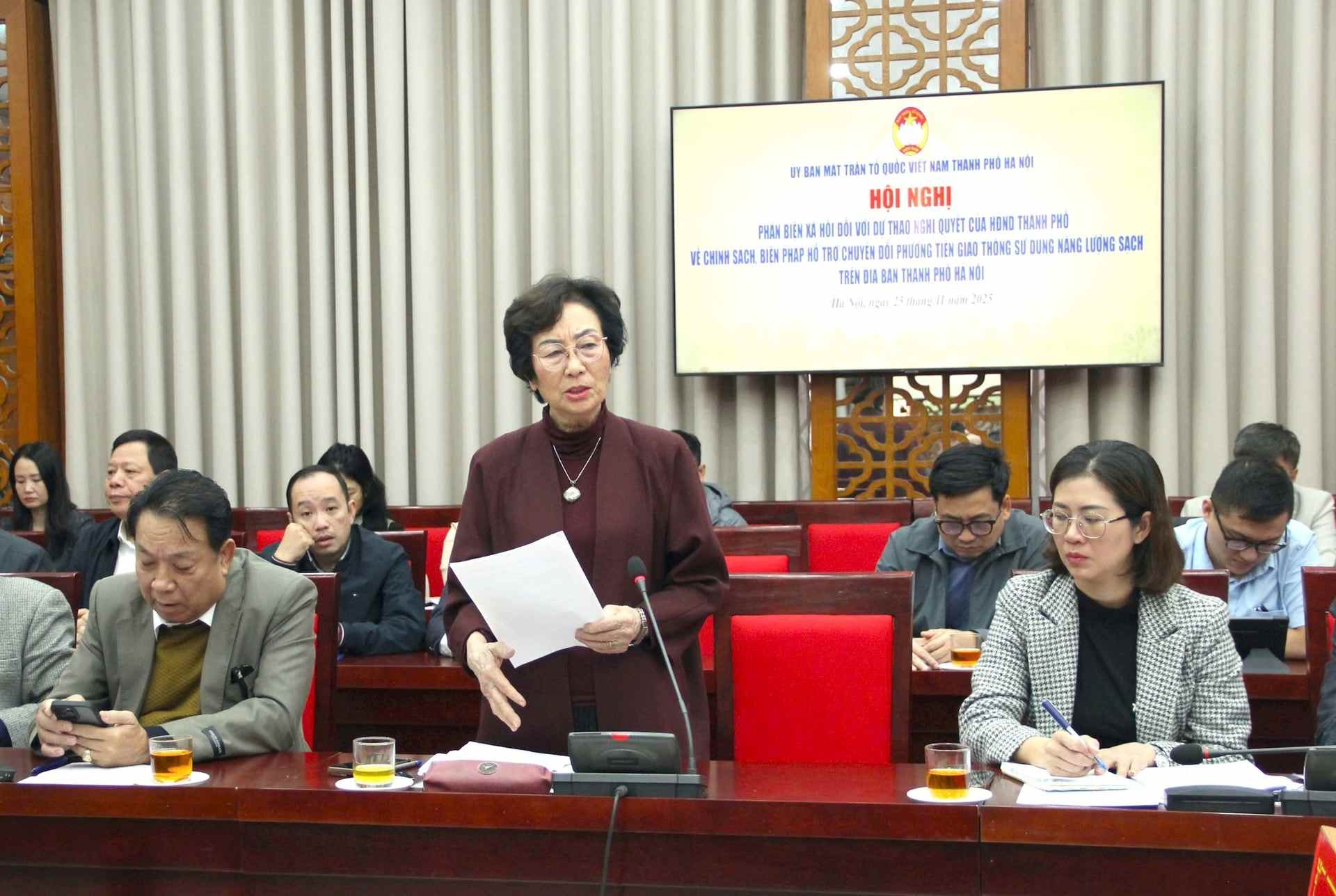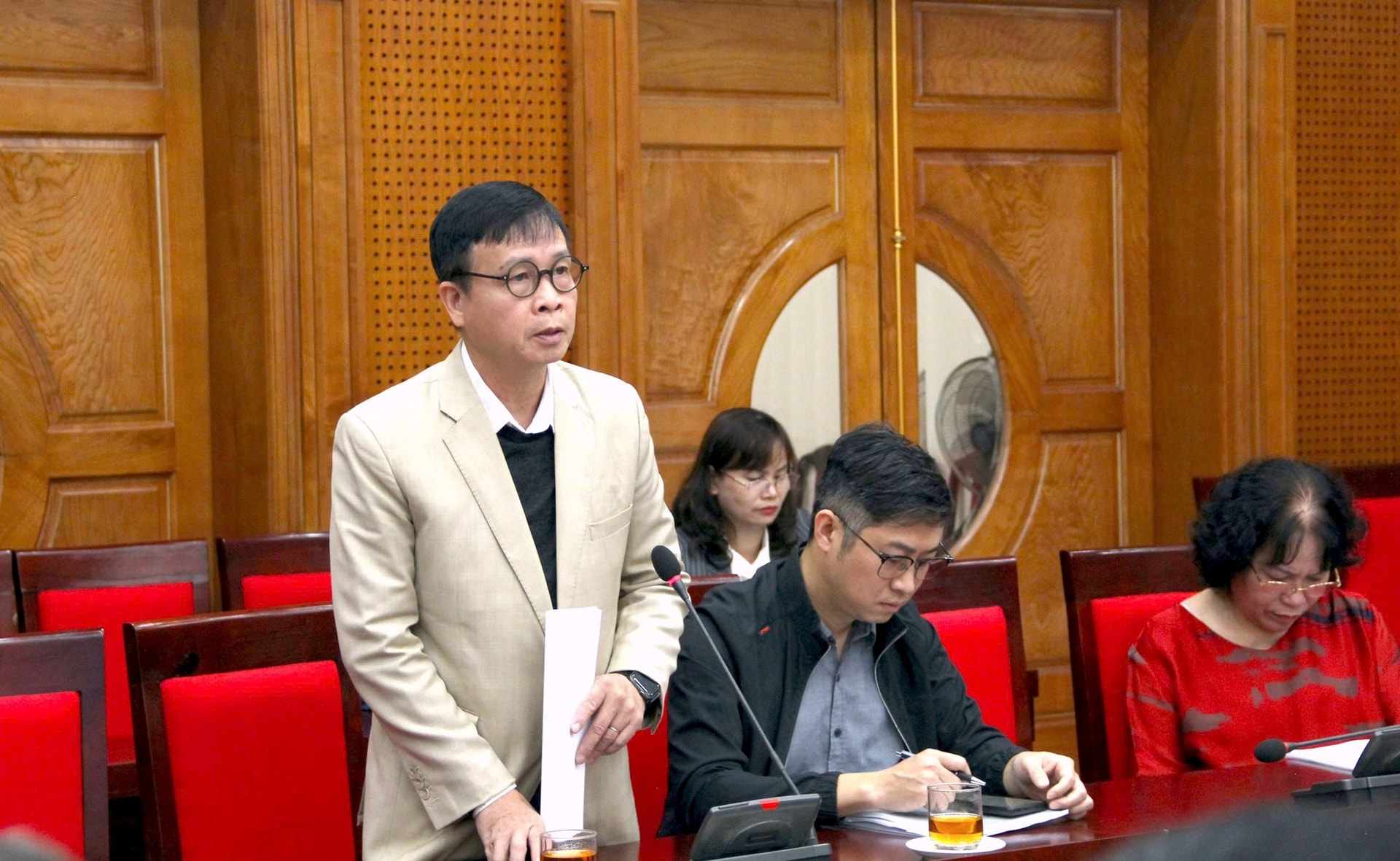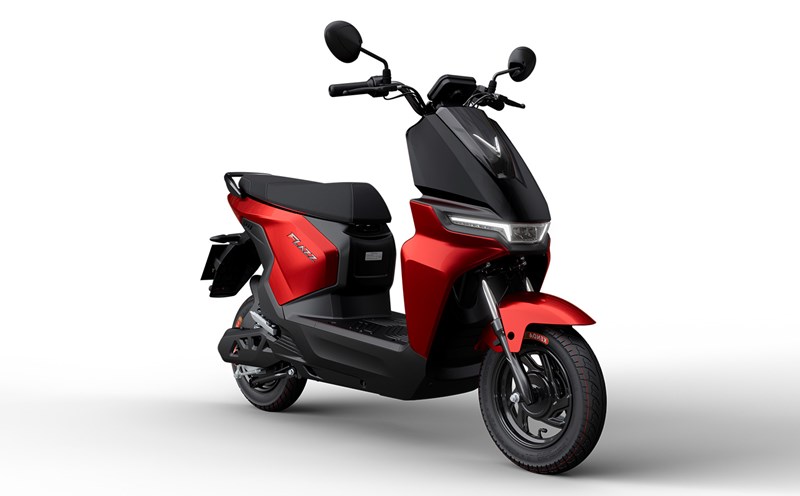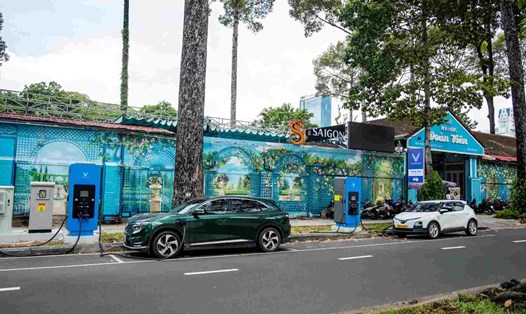On November 25, the Vietnam Fatherland Front Committee of Hanoi City held a conference to provide social feedback on the draft Resolution of the City People's Council on policies and measures to support the conversion of vehicles using clean energy in the area.
Presenting the draft Resolution "Policy and measures to support the conversion of clean energy vehicles in Hanoi city", Deputy Director of the Hanoi Department of Construction Do Viet Hai said that the drafting of the resolution aims to concretize the mechanisms and policies stipulated in Point b, Clause 2, Article 28 of the Capital Law.
The draft consists of 5 chapters, focusing on three key groups of policies: directly supporting people and businesses when converting vehicles; measures to limit emissions; and policies to develop infrastructure for public clean energy stations.
Regarding financial support, the draft states the level of direct financial support for individuals converting motorbikes and mopeds to electric vehicles, with a level of 20% or more of the value of the vehicle, with high priority for poor and near-poor households. Enterprises and organizations are supported with loan interest rates up to 30% when investing in green means of transport or implementing a green vehicle rental model to serve the community.
The fee policy includes supporting 50-100% of green vehicle registration fees depending on the target group; temporary exemption of road use and sidewalks for businesses providing green vehicle rental services.
At the conference, many opinions commented that this is a necessary but sensitive policy, affecting all classes, so the draft must be carefully prepared, cautiously, and widely consulted with sectors and people.
Associate Professor, Dr. Bui Thi An, Vice Chairwoman of the Economic Advisory Council (Vietnam Fatherland Front Committee of the city), President of the Hanoi Intellectual Women's Association, said that the draft is in line with the national strategy and urgent needs of the city. However, the support policy still lacks regulations on safety standards, lacks a mechanism to require buildings and parking lots to deploy charging stations.
Ms. Bui Thi An proposed to add: regulations on mandatory technical standards for batteries, charging stations, and fire prevention systems; require new apartments to arrange at least 5-10% of the area as charging stations; encourage the socialization of charging infrastructure associated with the PPP model or incentives for 5-year land rent exemption; build a mechanism for sharing general charging station data according to national standards.

Mr. Vu Thanh Vinh, member of the Democracy - Law Advisory Council (Vietnam Fatherland Front Committee of the city), assessed that green transport infrastructure is the "weakest point" of the draft. The city is seriously lacking public charging stations and a mechanism for socializing investment. If the infrastructure does not go ahead, the conversion of vehicles will be at a standstill.
Mr. Vinh proposed to plan a charging station network until 2030; exempt land use fees for businesses investing in charging stations; encourage charging installation at apartments, parking lots, and streets; supplement regulations on battery safety, fire prevention and fighting, battery recovery - recycling; perfect technical standards and regulations for electric vehicle inspection.
Regarding the support policy, MSc. Nguyen Hoang Hai, Vice Chairman of the City Public Passenger Transport Association, said that the cost of investing in green vehicles is still higher than cars using fossil fuels; charging and maintenance infrastructure can be expensive, technology fluctuates rapidly.
Therefore, support policies must be strong and smart enough to create motivation, including financial support such as preferential loans, low interest rates, exemption and reduction of registration fees, registration fees, public transport subsidy, training support, and tax incentives.
Mr. Hai proposed mechanisms to exchange used vehicles for green vehicles with clear support levels; support small transport businesses with preferential credit packages or guarantee funds; exempt or reduce registration fees, inspections, and license plate issuance for green vehicles for a certain period of time; subsidizes fares for users of green public transport; commits to supporting charging and maintenance infrastructure; develop incentive programs for technology vehicles - large groups and great impacts on the environment.
Considering the policy of supporting vehicle conversion as a "key point" but the draft is still lacking in specificity, Mr. Vu Thanh Vinh proposed adding a minimum support level for each group of subjects; preferential loan mechanism when buying electric vehicles; piloting the recovery and treatment of old vehicles that do not meet emission standards.
Regarding limiting measures such as banning vehicles using fossil fuels from circulating in Ring Road 1, towards Ring Road 2, Mr. Nguyen Hoang Hai commented that this is a strong step but needs to be cautious to avoid causing shock to people and small transport businesses.
The roadmap needs to take into account the financial capacity of the target groups: phase 1 prioritizes buses and large passenger cars; phase 2 only for private cars and motorbikes. At the same time, it is necessary to have a conversion support fund and specific policies for transportation businesses in disadvantaged areas.

Permanent Vice Chairman of the Vietnam Fatherland Front Committee of Hanoi Pham Anh Tuan emphasized that the transformation roadmap needs to be carefully evaluated to avoid causing difficulties for freelance workers and low-income groups. It is necessary to build a compensation and support mechanism that is clear and ensures social justice.
Mr. Pham Anh Tuan also suggested considering increasing the level of direct cash support for ordinary individuals (currently 20% of the value, maximum 5 million VND) to create stronger motivation for converting motorbikes and mopeds to electric vehicles, especially when the price of electric vehicles is still high.
At the same time, it is necessary to simplify procedures to prove the place of residence and temporary residence to avoid unnecessary administrative procedures; classify support subjects more clearly, attach support criteria to the income and pollution level of old vehicles to avoid spreading.











